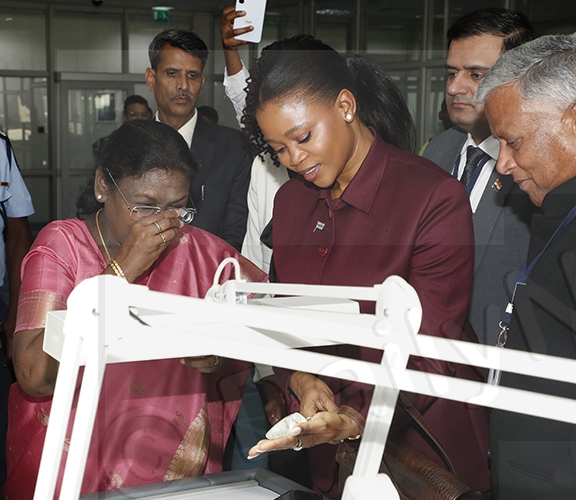IMF foresees economic recovery in Botswana
02 Jun 2022
The International Monetary Fund (IMF) expects the local economic recovery to continue this year and register a four per cent growth amid higher prices and demand for diamonds, good harvest following significant rainfalls and recovery in the tourism sector.
The International Monetary Fund (IMF) press release states that buffers were recovering due to a strong fiscal adjustment and improvement in the current account.
“Further monetary policy tightening will be required to reduce inflation pressures. The financial sector appears sound, but the impact of higher rates, declining liquidity and the recent monetary policy reform will have to be monitored,” states the press release.
The international organisation notes that continued fiscal consolidation, stronger policy frameworks, and the advancement of structural reforms will be required to create a more resilient and diversified economy.
IMF released the statement following its team’s visit to Botswana and held discussions on the 2022 Article IV consultation from May 4-8.
The team was led by Mr Papa N’Diaye, Assistant Director in the IMF African Department and Mission Chief for Botswana.
Mr N’Diaye noted that the consultation discussions were held in a context of high volatility in global commodities and COVID-19 outbreaks in Botswana’s key trading partners.
The Russian invasion of Ukraine has resulted in a surge in commodity prices.
“While higher demand for and prices of diamonds could result in some windfall for Botswana, higher food and energy prices will weigh on fiscal and external balances and threaten food security and energy affordability for the most vulnerable populations. At the same time, COVID-19 outbreaks in China, supply chain disruptions, and tighter financial conditions are projected to reduce global growth to 3.6 per cent this year, from 6.1 per cent in 2021,” warned Mr N’Diaye.
He noted that a successful vaccination campaign, prudent macro-economic management and strong demand for diamonds have allowed Botswana to recover to its pre-pandemic output level.
Botswana registered an economic growth of 11.4 per cent in 2021 and fiscal and current account deficits both narrowed sharply, and foreign reserves stabilized.
“Over 95 per cent of the eligible population were fully vaccinated by May 2022 and only 22 days of schooling were lost due to pandemic lockdowns,” notes the IMF.
While the economy is expected to recover, challenges remained. Unemployment rose to 26 per cent in 2021 while poverty and inequality have also increased.
“Inflation exceeded the central bank’s medium-term objective range of 3-6 per cent in 2021 and increased sharply in the first months of 2022,” the IMF states, and the Bank of Botswana raised the Monetary Policy Rate by 51 basis points in April.
The financial sector was assessed to be safe and sound, but the impact of higher rates, declining liquidity and the recent monetary policy reform will have to be monitored.
The IMF has applauded the government, saying its goal of achieving a fiscal surplus over the medium term was on track.
“Relative to the budget, however, social transfers will need to increase temporarily to help the most vulnerable households cope with the spillovers from the war in Ukraine,” the IMF states adding this is estimated to have a limited impact on the 2022 fiscal deficit.
“Beyond 2022, as energy and food prices ease, the additional pressure on the budget will fall,” it is said.
The IMF has also called for institutional reforms to deal with other fiscal challenges, while it acknowledges efforts from the government such as introducing a new framework for public wage formulation and a new expenditure rule.
Economic growth remains dependent on commodity prices and an abrupt slowdown in China or a protracted war in Ukraine could weaken global demand, thus lowering demand for diamonds.
Demand for Botswana’s diamonds could increase as sanctions against Russia continue.
“Outbreaks of more lethal and contagious COVID-19 variants could further hamper the recovery, particularly of tourism,” the IMF continues further stating that faster tightening of monetary policy in key advanced economies could trigger volatility in global markets, prompt capital outflows, and reduce demand for diamonds.
The 4 per cent growth is below the government’s target of 5 per cent to attain a high-income status by 2036.
IMF notes that excessive reliance on import substitution and restrictions to promote industrialization should be avoided but the ‘Reset Agenda’ should be accelerated.
The organisation said reforms should include deeper trade integration, implementation of planned visa and work permit reforms and faster investment in renewable energy.
“This will also help create the jobs needed to reduce unemployment and absorb the 35 000 annual labour market entrants,” it said. Ends
Source : BOPA
Author : Tebagano Ntshole
Location : MOLEPOLOLE
Event : Press release
Date : 02 Jun 2022





